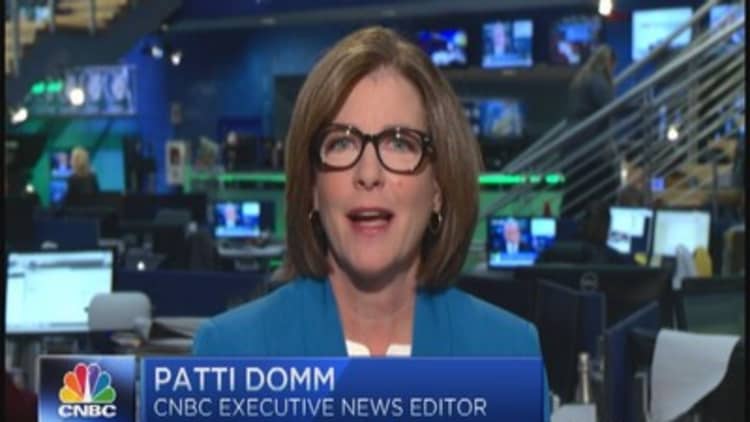
Blow-away Philly Fed data at a 1993 level, slightly stronger consumer inflation data, a surprise jump in home sales and still sub-300,000 weekly jobless claims. None of it has even ruffled the bond market.
Treasury yields stayed around levels they were at all morning Thursday, but the volume was higher than usual. The cash market is at 132 percent of the 10-day average volume by mid-morning, though recent volumes have been relatively low, according to CRT Capital.
Blame Alibaba.
Corporate issuance has been running hot, and Alibaba came to market Thursday with a massive $8 billion deal amid reports it was five times oversubscribed.
Corporate investment grade issuance is already more than $90 billion for the month to date, and this week's activity pushed 2014 issuance to a record $1.039 trillion so far, surpassing 2013's total of $1.036 trillion, according to Thomson Reuters IFR. Besides Alibaba's issuance, there was a $2 billion Johnson & Johnson deal; $2 billion from Dominion Resources; and $1 billion from Albemarle, according to IFR.
Alibaba offered a 5-year bond, to yield 0.95 percentage points more than comparable Treasurys.
"One $8 billion deal is not just an $8 billion deal. It has a series of flows behind that that could generate multiples of $8 billion in related hedgings, swaps, etc," said David Ader, chief Treasury strategist at CRT Capital. Investors hedging the Alibaba or other corporate deals, for instance, might sell Treasurys ahead of the deal and then buy them back after it.
"I frankly think the way the market is trading, we're going to improve. We're going to see some lower yields. If we can hold on in the face of this type of stuff. I think the market is making a statement," Ader said. Stronger U.S. data are typically a negative for the bond market, resulting in selling and higher yields.
Watch More: Debate it! Alibaba vs. Apple
Ader pointed to dollar-yen, trading above 118.80 on Thursday. He said weak currency and low yields in Japan may be one factor sending investors to the U.S. market. European PMIs also weighed on markets there but sent buyers into U.S. bonds.
The Philadelphia Fed business index was a shocking 40.8, versus an expected 18 and October's 20.7. The consumer price index was flat, dragged down by energy costs, but better than the 0.1 percent decline that was expected.
Read More
Existing home sales rose 1.5 percent, the briskest pace this year for an annual rate of 5.26 million. It was the first month in 2014 when sales improved over year-earlier levels, up 2.5 percent.
Yields moved slightly higher after the CPI report, but selling didn't last. The 10-year yield ranged between 2.30 and 2.35 on Thursday.
U.S. yields moved slightly higher but less than might normally be expected. The 10-year yield does not look to be breaking out of a 17-session range. The 10-year closing yield has ranged between 2.30 and 2.38 percent in that time.
The 10-year was sought as a safe haven earlier in the day when European PMIs came in weaker than expected. The German bund, correlated to the Treasury yield, also saw its yield move lower, but the positive U.S. data were not promptly reflected in bunds and the spread between the two widened by 4 basis points.


